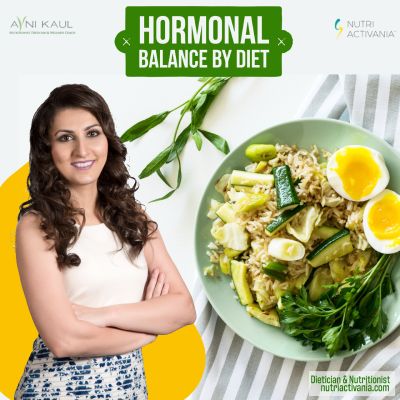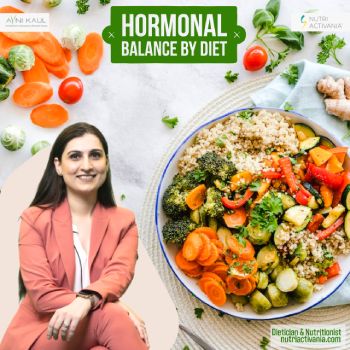
Hormones are essential chemical messengers formed by the endocrine system to regulate various processes in the body, including metabolism, reproduction, and stress response. Achieving and maintaining hormonal balance is vital for overall well-being and optimal bodily functions. Even slight imbalances in hormone levels can have profound effects on physical and psychological health, such as mood swings, weight fluctuations, fatigue, and fertility issues. While several factors contribute to hormonal balance, nutrition plays a critical role in regulating hormone levels effectively. Read this blog from the top dietician for hormonal health in Delhi, Avni Kaul, where she talks about diet tips to manage hormonal balance.

Omega-3 fatty acids
Omega-3 fatty acids are crucial polyunsaturated fats that are essential for hormone production and regulation. These healthy fats can be obtained from fatty fish like salmon, sardines, and mackerel, as well as from plant-based sources like walnuts, flaxseeds, and chia seeds. Including omega-3 fatty acids in your diet helps combat inflammation, which is commonly associated with hormonal imbalances. Moreover, they support the production of beneficial prostaglandins, hormone-like substances that play a key role in regulating various bodily functions.
Vitamin D
In addition to its well-known role in promoting bone health, vitamin D also plays a critical role in hormone regulation. This essential vitamin is involved in the production and release of hormones, including insulin, estrogen, testosterone, and thyroid hormones. Furthermore, vitamin D receptors are present in various tissues throughout the body, highlighting it’s involvement in numerous physiological processes. While sunlight exposure remains the primary source of vitamin D, it can also be obtained from certain foods like fatty fish, fortified dairy products, and egg yolks.
Magnesium
Magnesium is a mineral that participates in more than 300 enzymatic reactions within the body, including those involved in hormone production and regulation. It plays a crucial role in supporting the health of the adrenal glands, which produce stress hormones like cortisol. Additionally, magnesium helps maintain balanced blood sugar levels, which is essential for preventing insulin resistance and hormonal imbalances. Leafy green vegetables, nuts, seeds, whole grains, and legumes are excellent dietary sources of magnesium that can be incorporated into your daily diet.

Vitamin B
The B vitamins, including vitamins B6, B12, and folate, are vital for hormone synthesis and metabolism. Vitamin B6, particularly, plays a crucial role in the production of neurotransmitters and steroid hormones. It also supports the detoxification of estrogen, preventing its buildup in the body. Whole grains, legumes, leafy green vegetables, nuts, seeds, and animal products are excellent food sources of B vitamins that can be incorporated into your diet to support hormonal balance.
Zinc
Zinc, a trace mineral, is vital for maintaining hormonal health and balance. It plays a significant role in the production, release, and metabolism of hormones such as insulin, thyroid hormones, and reproductory hormones. Insufficient zinc levels have been linked to menstrual irregularities, fertility problems, and imbalances in estrogen and progesterone levels. Including dietary sources rich in zinc, such as oysters, lean meats, poultry, legumes, nuts, seeds, and whole grains, can help ensure an adequate intake of this important mineral to support hormonal equilibrium.
Specific food items can potentially contribute to hormonal imbalance. So it is beneficial to avoid them if you want to maintain hormonal health. Consider eliminating red meat, soy products, dairy products, caffeine, cruciferous vegetables (such as cauliflower, broccoli, and kale), and processed foods (like cookies and bread) from your diet to minimize the risk of hormonal disruptions. By making these dietary adjustments, you can support a healthier hormonal balance.
Avni Kaul is Founder of Nutriactivania with Masters Degree in Food and Nutrition from University of Delhi and is also a Certified Diabetes Educator from Project Hope and International Diabetes Federation. She is a Leicester Mammas Ambassador trained in Lactation Counselling with NHS United Kingdom. Mammas support pregnant and new mothers and their families. Specializations of Avni Kaul Include Infant and Young Child Feeding Practises, Pre and Post natal diets, Fat loss, Muscle Gain and Holistic Health and Nutrition